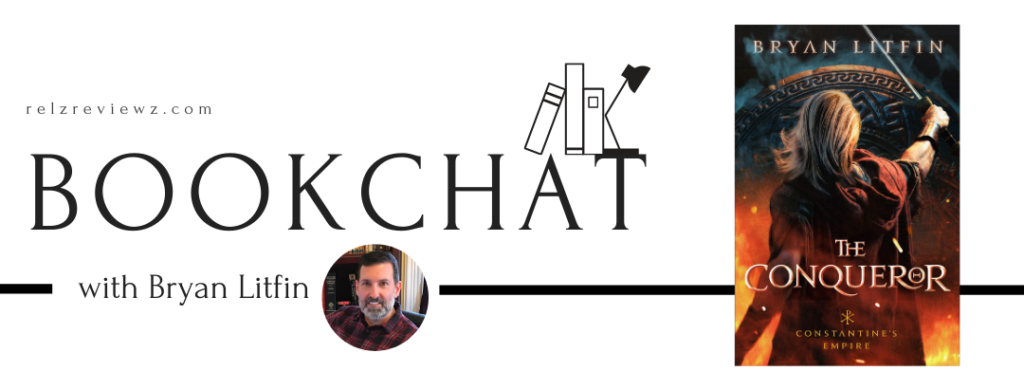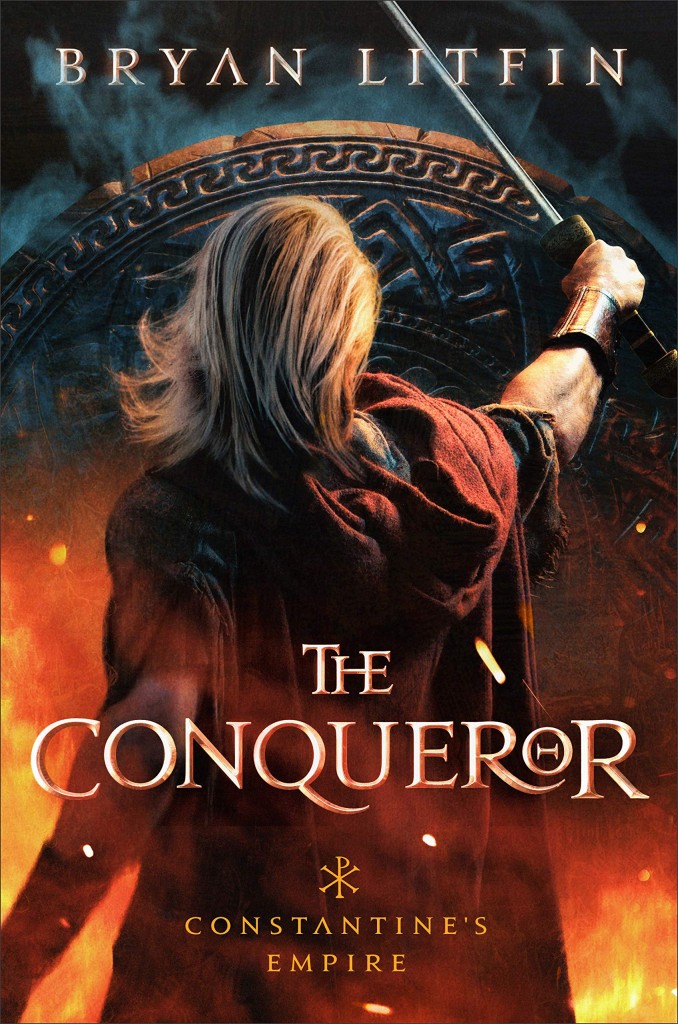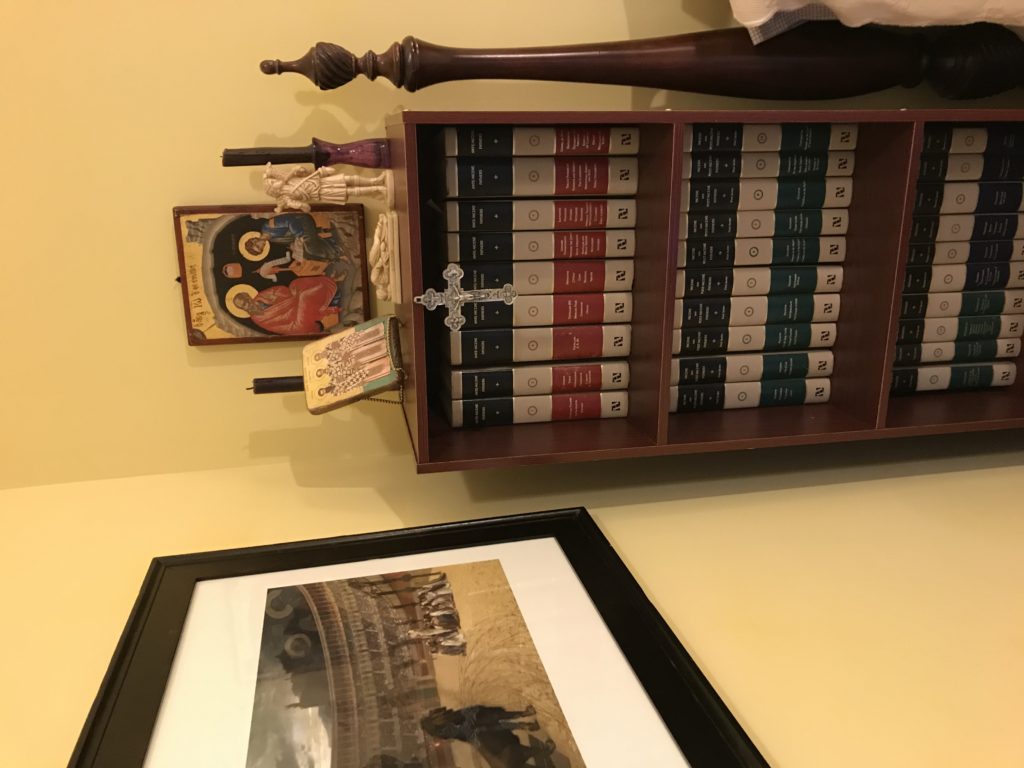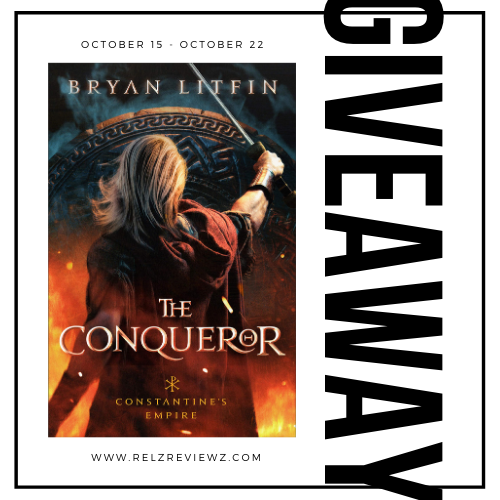
Biblical scholar Bryan Litfin is highly qualified to bring us the story of Constantine’s Empire, The Conqueror being the first in a new trilogy. I’m fascinated by this era, the trials faced by the new Christian church, and the barbaric world the Romans had created. As the influencer of Christ-followers spread, the impact of their startling new beliefs began to influence those in leadership and beyond, all the way to the Roman emperor.
Enjoy the insights Bryan gives about his characters, the major themes of this story, and what inspired him to write about this pivotal moment in time.
With thanks to Revell, we have a copy to give away so be sure to enter the giveaway below.
For now, over to you, Bryan!

It is AD 312. Rome teeters on the brink of war. Constantine’s army is on the move. On the Rhine frontier, Brandulf Rex, a pagan Germanic barbarian, joins the Roman army as a spy and special forces operative. Down in Rome, Junia Flavia, the lovely and pious daughter of a nominally Christian senator, finds herself embroiled in anti-Christian politics as she works on behalf of the church.
As armies converge and forces beyond Rex’s and Flavia’s controls threaten to destroy everything they have worked for, these two people from different worlds will have to work together to bring down the evil Emperor Maxentius. But his villainous plans and devious henchmen are not easily overcome. Will the barbarian warrior and the senator’s daughter live to see the Empire bow the knee to Christ? Or will their part in the story of Constantine’s rise meet an untimely and brutal end?
Travel back to one of the most pivotal eras in history–a time when devotion to the pagan gods was fading and the Roman Empire was being conquered by the sign of the cross.
Bookchat with Bryan
Please share a little about your characters, Brandulf Rex and Junia Flavia
Brandulf Rex has a Germanic name, which he was given at birth, and a Latin name that he goes by in the story. Rex is from the tribe of the Alemanni, but he’s recruited into the Roman army as a special forces operative because his skills as a warrior and his imposing physique are so impressive. He is brave, principled, and intelligent—fierce in fighting bad guys, protective of the vulnerable. Though he worships the pagan gods, he’s on the journey of understanding who Christ really is.
Lady Junia Flavia is the teenage daughter of a Roman senator. Though she is both wealthy and beautiful, these things are not the primary aspects of her life because she is a Christian. Devotion to Christ is more important to her than worldly attractions. Flavia is sweet by nature, yet bold in confronting evil. The martyrs of the ancient church are her heroes, so she keeps their brave examples before her mind. When she meets Rex, she desires for him to know her God as well.
Describe your book in 5 adjectives:
Adventurous, exciting, romantic, swashbuckling, historical.
What inspired this story?
I’m a scholar of ancient church history. I wanted to tell a story from this pivotal era that shaped the modern Christian faith so much. I love the world of ancient Rome and all the amazing sagas that took place in it. Some of those grand narratives included Christianity, and those need to be laid out for the reader’s enjoyment and contemplation!

What is Rex’s biggest weakness?
He is utterly self-reliant. His confidence brims over the top, so he doesn’t think he needs anyone’s help. Even the gods are just minor additions to his life. He has a hard time thinking that he should ever bow the knee to Jesus as Lord.
What motivates Flavia’s choices?
She asks herself, not “What is best for me?” but “What is best for the purposes of Christ and his holy Catholic church?”
Share something you discovered while researching this story that surprised you:
The novel is set in the age of Emperor Constantine. Some people think he was a “fake” Christian who claimed to believe in Jesus for political motives. But the more you dig into him, the more you get the idea that his faith was real. Of course, his spiritual life evolved gradually, and it took him some time to really leave the trappings of his pagan culture behind. Yet, I think we should view this man as a true Christ-follower who tried to bring Jesus to the Roman Empire as best he knew how.
What are the major themes in this story?
The entire plot centers around “conquering.” Who is The Conqueror? Is it Rex, who must conquer his own self-reliance? Is it Flavia, who must conquer the deepest longings of her soul? Is it Constantine, who brought the armies of a wicked tyrant into submission? Is it the ancient church, which defeated the domineering power of Rome with love? Or is it Jesus, who is seeking to be Lord of your own life today?
What parallels do you see between the lives of people living in AD 312 and to how we live in 2020?
Ancient faith in Jesus has so much in common with our modern faith. Although the early church’s particularities are different from the way we think today, the core is the same: exalting the risen Christ, sharing the Good News with unbelievers, standing against the temptations of a prideful and sinful culture, bearing witness to Jesus with bravery and self-sacrifice.

As Christians today, what can we learn from the early church’s struggles and successes?
Never compromise your belief in the Lord! Not in the good times nor in the bad. Not when society applauds you, nor when they send out lions to devour you alive. Stand strong for Jesus Christ no matter what.
Which character did you enjoy writing most?
I identify a lot with Rex because he is a struggler on a journey. He has an independent streak that makes him think he doesn’t need people to help him, not even God. But actually, we all do. It’s pride that makes us think otherwise. Pride is a hard beast to conquer!
Which character gave you the most grief?
Flavia is asked to make great sacrifices in this novel. There were times that I had tears in my eyes as I wrote her story. For an author, that’s not a bad thing, because then it will come out on the page. As the poet Robert Frost said, “No tears in the writer, no tears in the reader.”
What emotions did you experience while writing this story?
Primarily, it was joy. I love this historical time period. I know it extremely well from my decades of academic study. It was a joyful experience to unfold this exciting story that can be shared with a wide audience.
What is in your writing pipeline now?
Books 2 and 3 of this trilogy, of course! The story of Rex and Flavia is by no means complete in The Conqueror. There are so many more inspiring events of ancient church history that they need to be part of, including the establishment of the canon of Scripture, the founding of St. Peter’s Basilica in Rome, the formation of the Nicene Creed, and the discovery of the actual Tomb of Christ in Jerusalem!
Thanks Bryan!

Bryan Litfin is the author of the Chiveis Trilogy, as well as several works of
nonfiction, including Early Christian Martyr Stories, After Acts, and Getting to Know the Church Fathers. A former professor of theology at the Moody Bible Institute, Litfin earned his PhD in religious studies from the University of Virginia and his ThM in historical theology from Dallas Theological Seminary. He is currently an acquisitions editor for Moody Publishers. He and his wife have two adult children and live in Wheaton, Illinois. Learn more at www.bryanlitfin.com.
Relz Reviewz Extras
Visit Bryan’s website and blog
Buy at Amazon: The Conqueror or Koorong












October 17, 2020 at 6:45 am
The Medieval era is fascinating.
October 20, 2020 at 7:35 am
I love the Viking era, but Ancient Roman and Medieval eras are close seconds!😃😉